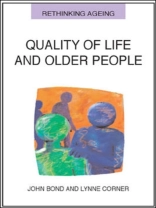·What is quality of life?
·How should we assess quality of life for older people?
·What are the personal and external influences on quality of life for older people?
Quality of Life and Older People provides a critical approach to the conceptualization and measurement of quality of life in social gerontology and health and social care research. The book re-examines what we mean by ”quality of life” in a post-modern world, and examines the impact of continuous personal and social changes on the lives of older people.
The book explores ideas about quality of life in social gerontological literature, and describes the experiences of older people through both their own personal accounts and representations in everyday life, popular culture and scientific research. In this way, the book is unique, since it reviews the way that older people talk about their quality of life and how this differs from the ways that younger people, researchers and scientists, policy makers and professionals discuss it. The book draws on a range of behavioural and social science knowledge to present a new way of thinking about and understanding quality of life and older people.
While the book provides a critique of existing social science theories underpinning conceptions of quality of life it also addresses operational issues for the use of quality of life in social gerontological research.
Quality of Life and Older People is essential reading for undergraduate and postgraduate students taking courses in gerontology, medicine, nursing, social work and social sciences. It is also of interest to social gerontologists and health and social care researchers, as well as to those involved in the planning and delivery of services to older adults.












